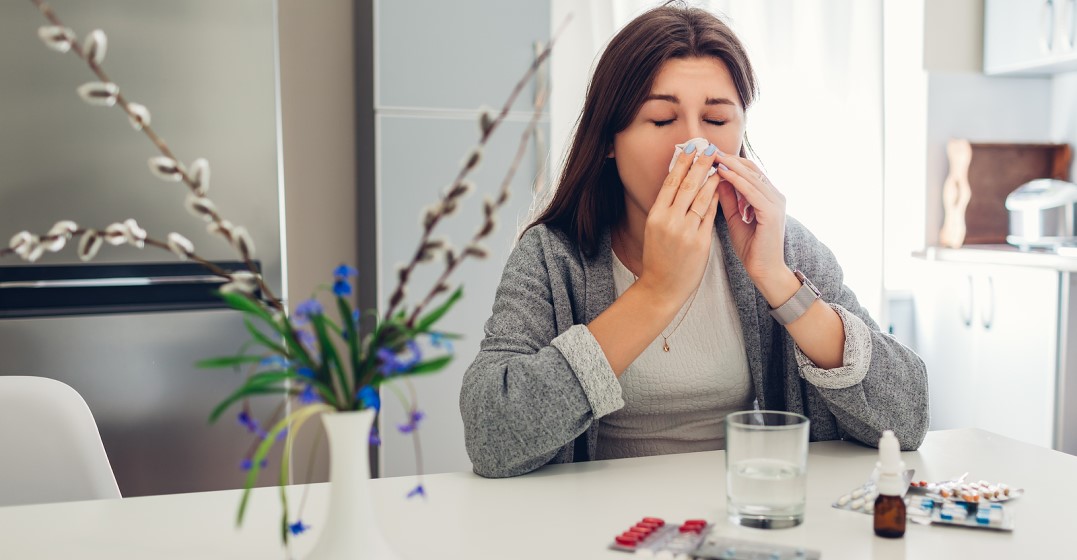If you’ve ever suffered from allergies, you know just how much they can ruin things.
A day at work. A meal with friends. A dream vacation.
But there’s only one thing that would be just as inconvenient – not being able to express your allergies before things get real.
When planning your trip to a German-speaking country – or if you already live in one – make sure to master this vocabulary to talk about your allergies. The last thing you want is a bad experience which could’ve been avoided by good-ol’ communication in German!
The best part? Once you know the name of your allergen in German, it’s pretty easy to create a combo for your allergy: you just add “allergie” in front of it! So let’s review some key phrases you can use and what this rule looks like in practice.
Guide to being sick in a foreign country
Food allergies in German
So you’re at a fancy restaurant in a German-speaking country and want to avoid certain ingredients. Here is a short list of common food allergens:
- die Eier (eggs)
- die Soja (soy)
- die Erdnüsse (peanuts)
- die Milch (milk)
- die Meeresfrüchte (seafood)
- der Fisch (fish)
- der Senf (mustard)
- das Gluten (gluten)
Lead with “Ich kann kein(e)(n) essen” (I cannot eat….). For example, you might say:
- Ich kann keine Eier essen. (I can’t eat eggs.)
- Ich kann keine Erdnüsse essen. (I can’t eat peanuts.)
- Ich kann keine Milch trinken. (I can’t drink milk.)
- Ich kann keine Meeresfrüchte essen. (I can’t eat seafood.)
You can also ask if your allergen was used in the making of a dish:
- Ist in diesem Gericht Soja? (Is there soy in this dish?)
Of course, the logical sequence would be to ask waiters not to include this in your order:
- Können Sie bitte die Erdnüsse entfernen? (Can you please remove the peanuts?)
- Kann ich dieses Gericht ohne Erdnüsse haben? (Can I have this dish without the peanuts?)
How to describe breathing allergies in German
There’s nothing worse than cough, fever, red eyes and difficulty breathing when all you want to do is enjoy your vacation. But if you manage to warn the people around you of your allergies, you might be able to avoid them (for example, pets)! Here are the most common respiratory allergies:
- der Pollen (pollen) – die Pollenallergie (pollen allergy)
- der Staub (dust) – die Hausstauballergie (home dust allergy)
- der Schimmelpilz (mould) – die Schimmelpilzallergie (mould allergy)
- die Hunde (dogs) – die Hundeallergie (dog allergy)
- die Katzen (cats) – die Katzenallergie (cat allergy)
- die Haustiere (pets) – die Haustierallergie (pet allergy)
- die Wolle (wool) – die Wollallergie (wool allergy)
Other allergies
Below you’ll find the words for other common allergies that don’t really fit into the previous categories:
- der Latex (latex) – die Latexallergie (latex allergy)
- das Penizillin (penicillin) – die Penizillinallergie (penicillin allergy)
- die Bienen (bees) – die Bienengiftallergie (allergy to bee poison)
- Die Wespen (wasps) – die Wespenstichallergie (allergy to wasp bite)
How to say you’re allergic to something in German
Easy! Just say “Ich bin allergisch gegen…” (literally: “I’m allergic against…”) or “Ich reagiere allergisch auf…” (literally: “I react allergically to…”), depending on the allergy. Here are some examples:
- Ich bin allergisch gegen Penizillin. (I’m allergic to penicillin.) = Ich reagiere allergisch auf Penizillin.
- Ich bin allergisch gegen dieses Medikament. (I’m allergic to this medication.) = Ich reagiere allergisch auf dieses Medikament.
- Ich bin allergisch gegen Pollen. (I’m allergic to pollen.) = Ich reagiere allergisch auf Pollen.
- Ich bin allergisch gegen Haustiere. (I’m allergic to pets.) = Ich reagiere allergisch auf Haustiere.
Would you be ready?
Walking the streets of Vienna, Berlin or Zürich and sitting at a gorgeous restaurant only to end up getting an allergic reaction to food is no fun. Would you be ready to explain your allergies to the waiter, a friend or a doctor? Use these expressions out loud and find out. Let us know how you did!
Maria Inês Teixeira
Maria Inês has been working as a language teacher and blogger for more than 2 years. Born and raised in Portugal, she got a BA in Art Studies and a MSc in Cultural Management.

